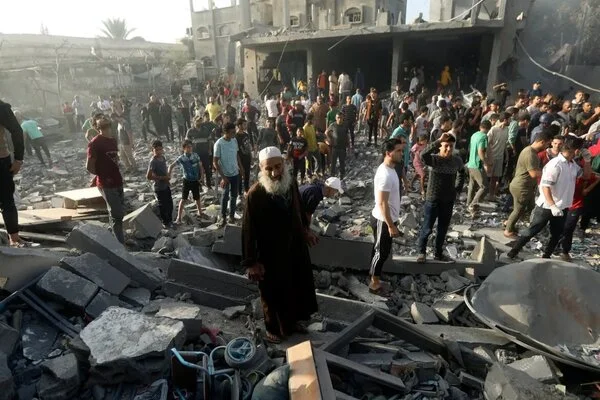More Israeli Attacks, More Death and Destruction in Gaza

The Israeli-Gaza conflict has entered its second month with Israel launching another wave of attacks across the Gaza Strip. Recent air raids have targeted United Nations facilities, where thousands of displaced people sought shelter, and hospitals that have been overwhelmed by wounded individuals and running low on power and supplies.
Attack in southern city of Khan Younis
On Tuesday, an early morning Israeli attack destroyed several homes in the southern city of Khan Younis, creating a tragic scene that affected civilians, including babies, children, and the elderly.
“We were sleeping, babies, children, elderly,” said one survivor, Ahmad al-Najjar, who is the general director at the Ministry of Education in Gaza
In Khan Younis, a school hosted thousands of displaced individuals living in classrooms and the playground, with one resident, Suhaila al-Najjar, expressing concern about the future given the closures of bakeries, the scarcity of gas, and the lack of access to food.
Rescue workers in Deir el-Balah managed to retrieve at least four bodies and several wounded children from the debris of a flattened building, resulting in heart-wrenching scenes and emotional cries from the affected families.

Israeli airstrikes hit near Gaza’s Al-Quds Hospital
Israeli airstrikes struck near Gaza City’s Al-Quds Hospital on Monday night, as reported by the Palestine Red Crescent Society.
“[Israel] targeted the vicinity of Al-Quds Hospital in the Gaza Strip with two missiles, approximately 50 meters away from the hospital gate,” the group said.
In previous statements, the Israeli military had urged civilians in Gaza City to relocate south of Wadi Gaza, a waterway dividing the center of the enclave, for their safety. It had also mentioned striking 450 Hamas targets in the strip within a 24-hour period.
On Sunday, the Red Crescent group confirmed that significant explosions near Al-Quds Hospital resulted in casualties, including several fatalities.
Growing International Condemnation
The conflict has received growing international condemnation, with rights groups and top United Nations officials describing it as a human catastrophe and a moral failing. Israeli Prime Minister Benjamin Netanyahu, however, has ruled out a ceasefire and the delivery of much-needed fuel to Gaza. He has also indicated the intention to maintain a security presence in Gaza even after the war ends.
The humanitarian situation remains dire, with a majority of Gaza’s 2.3 million residents having fled their homes, resulting in a severe shortage of food, medicine, fuel, and water.
Amid this crisis, three Palestinian rights groups have warned of imminent threats of forced displacement and ethnic cleansing, and approximately 1.5 million Palestinians have been internally displaced across the besieged territory. The situation continues to deteriorate, with no immediate resolution in sight.

- Art
- Causes
- Best Offers
- Crafts
- Dance
- Drinks
- Film
- Fitness
- Food
- Jogos
- Festival
- Gardening
- Health
- Início
- Literature
- Music
- Networking
- Outro
- Party
- Religion
- Shopping
- Sports
- Theater
- Wellness



